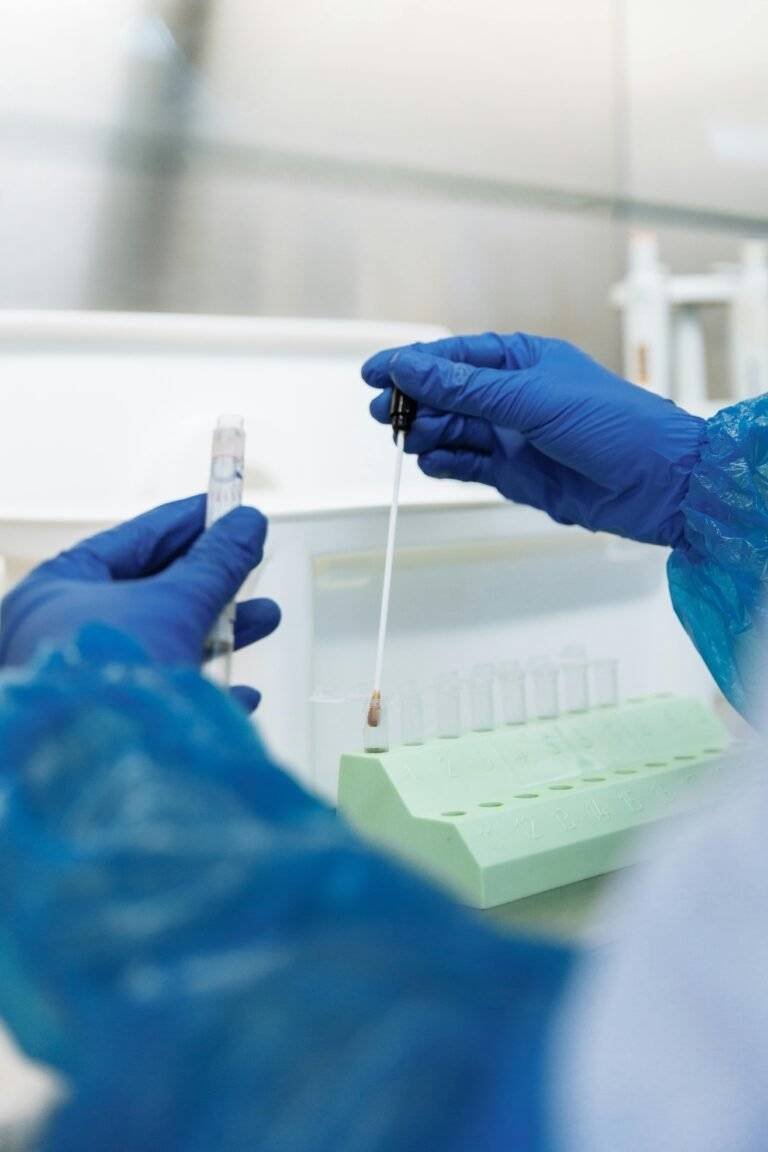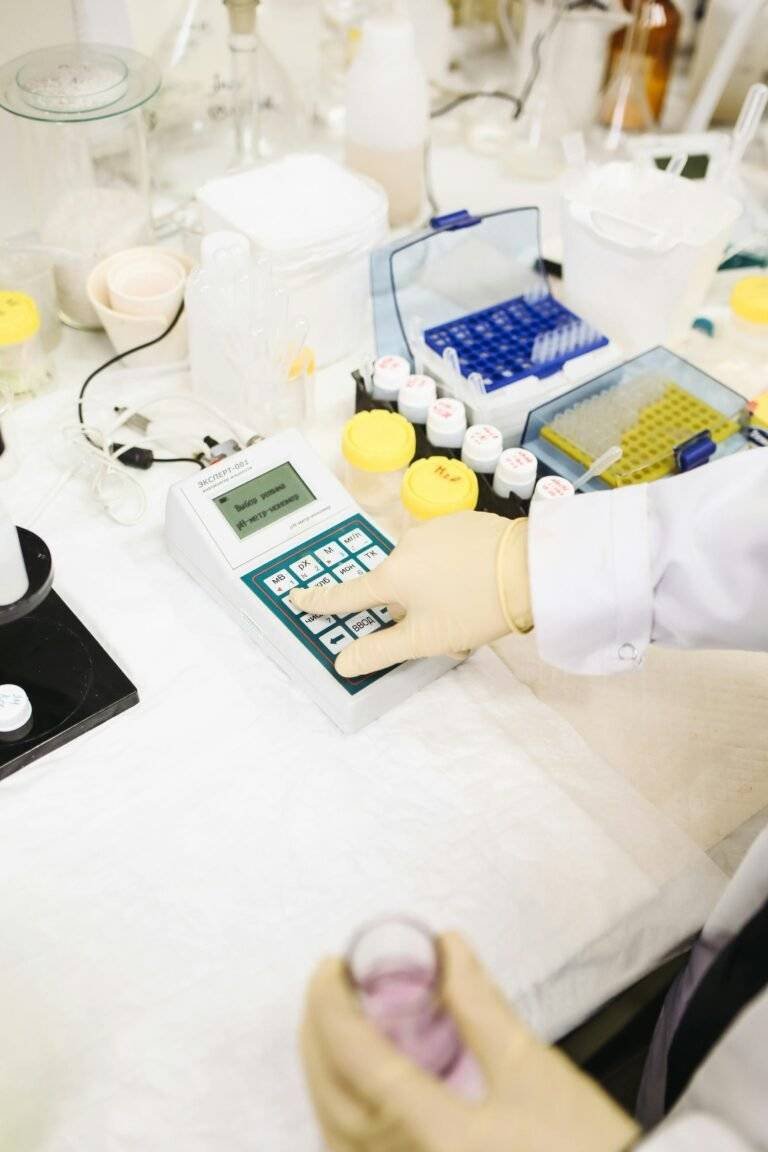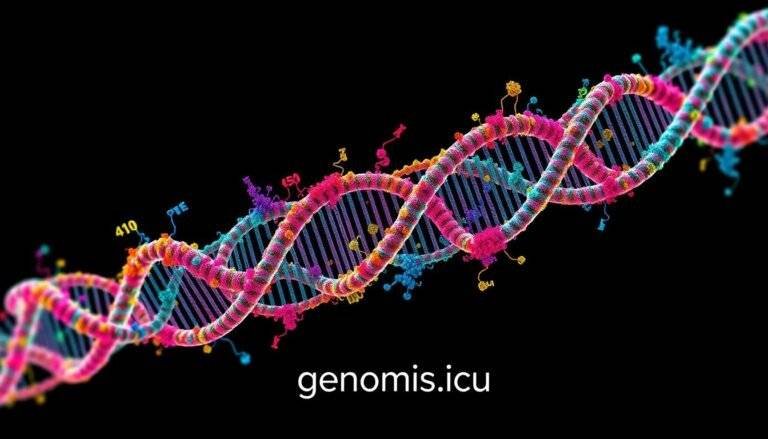Leading Whole Genome Sequencing Companies to Choose From
Whole genome sequencing is changing the game in research and medicine. As it gets cheaper, more people and groups are seeing its value. It’s key to know what each top company offers.
The market for whole genome sequencing is expected to hit $35 billion by 2030. Companies like Illumina, Pacific Biosciences, 10X Genomics, and Bionano Genomics are leading the way. They provide different technologies to meet the needs of scientists, doctors, and healthcare teams.
Key Takeaways
- The whole genome sequencing market is projected to reach $35 billion by 2030 as costs continue to decline.
- Leading companies in the field include Illumina, Pacific Biosciences, 10X Genomics, and Bionano Genomics, each offering unique sequencing technologies and applications.
- Comprehensive DNA analysis through whole genome sequencing is transforming research, clinical diagnostics, and personalized medicine.
- Navigating the landscape of whole genome sequencing providers requires understanding their strengths, technology capabilities, and service offerings.
- Selecting the right whole genome sequencing company is crucial for aligning with specific research, clinical, or diagnostic needs.
What is Whole Genome Sequencing?
DNA sequencing has changed a lot. It used to take 13 years and cost $2.7 billion. Now, it can be done in a day for under $600. Whole genome sequencing looks at all of an individual’s DNA, which has 3.05 billion base pairs.
This technology is key for understanding genetic variations and disease risks. It also helps in creating personalized medical treatments.
Overview of Whole Genome Sequencing
Sequencing costs have dropped a lot. This makes whole-genome sequencing a strong tool for genomics research. It can give insights into disease and genetics.
Sequencing small genomes (≤ 5 Mb) lets us study thousands of small organisms at once. This is done using next-generation sequencing (NGS). De novo sequencing is when we sequence a new genome without a reference.
Importance in Modern Medicine
Human whole-genome sequencing gives us a detailed look at our genes. This helps in making personalized medicine better. Long-read sequencing helps solve hard parts of the genome.
Whole-genome sequencing is also good for making drug-metabolizing enzyme databases. Studies show it’s better for checking leukemia samples than old methods.
“Whole genome sequencing (WGS) program in the U.S. saves hundreds of millions of dollars annually.”
Key Benefits of Whole Genome Sequencing
Whole genome sequencing (WGS) is changing medicine in big ways. It gives a detailed look at our genes, helping in personalized care and disease research. This method is more detailed than old genetic tests.
Personalized Medicine Advantages
WGS helps find genetic predispositions for better treatments. Doctors can use your unique genes to predict risks and tailor treatments. This leads to more effective care.
Enhanced Disease Understanding
WGS is key in studying diseases. It shows how genes affect complex conditions. This knowledge helps create better tests and treatments.
| Metric | Value |
|---|---|
| Genetic Information Provided | 3,000 times more than partial autosomal DNA sequencing |
| Genome Coverage | Comprehensive, including both coding and non-coding regions |
| Depth of Sequencing | Typically 30x, meaning the genome is sequenced 30 times |
WGS is a game-changer. It helps us understand genes better, leading to better treatments and research. This improves health care for everyone.
“Whole genome sequencing is a game-changer in personalized medicine, enabling us to uncover genetic insights that were previously inaccessible.”
Top Whole Genome Sequencing Companies
In the world of [https://genomics.icu/what-is-an-example-of-genomics/] sequencing technology, a few companies lead the way. They are pushing the boundaries of [https://genomics.icu/what-is-an-example-of-genomics/] market share. They offer detailed [https://genomics.icu/what-is-an-example-of-genomics/] genomic solutions to many.
Illumina: A Market Leader
Illumina is a pioneer in [https://genomics.icu/what-is-an-example-of-genomics/] sequencing technology. It holds over 90% of the market share. With 17,000+ systems installed worldwide, its platforms like NovaSeq and HiSeq have changed the game.
These systems make [https://genomics.icu/what-is-an-example-of-genomics/] sequencing faster and more accurate. This makes Illumina a top choice for research, clinical, and diagnostic needs.
Thermo Fisher Scientific: Comprehensive Solutions
Thermo Fisher Scientific is a global leader in [https://genomics.icu/what-is-an-example-of-genomics/] sequencing technology. It offers a wide range of instruments, consumables, and software. In 2021, it made $39.211 billion in revenue.
The company has been investing in cutting-edge [https://genomics.icu/what-is-an-example-of-genomics/] sequencing solutions. Its FDA-approved Oncomine Dx Target Test is a big step in precision oncology.
BGI: Pioneering Genomics Innovation
BGI Genomics is a leading provider of [https://genomics.icu/what-is-an-example-of-genomics/] genomic services and solutions. It finished 2021 with $1.062 billion in revenue. The company has partnered with Natera to offer the BGI/Natera Signatera Assay.
This assay is a personalized cancer monitoring test. It expands BGI’s [https://genomics.icu/what-is-an-example-of-genomics/] genomic offerings.
PacBio: Long-Read Sequencing Expertise
Pacific Biosciences (PacBio) specializes in long-read sequencing. Its SMRT technology generates high-quality, long-read sequences. These are crucial for complex genomic applications.
They are especially useful for resolving structural variations and repeat sequences. PacBio’s focus on long-read sequencing sets it apart in the market.
| Company | Revenue (2021) | Market Share | Key Focus |
|---|---|---|---|
| Illumina | $4.526 billion | Over 80% | Market leader in [https://genomics.icu/what-is-an-example-of-genomics/] sequencing technology |
| Thermo Fisher Scientific | $39.211 billion | N/A | Comprehensive [https://genomics.icu/what-is-an-example-of-genomics/] genomic solutions |
| BGI Genomics | $1.062 billion | N/A | Pioneering [https://genomics.icu/what-is-an-example-of-genomics/] genomics innovation |
| PacBio | N/A | N/A | Expertise in long-read [https://genomics.icu/what-is-an-example-of-genomics/] sequencing technology |
Factors to Consider When Choosing a Company
When picking a company for your whole genome sequencing, several key factors matter. Look at the costs, technology, and the quality of customer support. Each provider has its own strengths and specialties. By carefully looking at these, you can find the right partner for your needs.
Pricing Structures and Packages
The cost of whole genome sequencing varies a lot. Companies offer different pricing models, like one-time fees or subscription plans. Get quotes from several providers to find the best deal for you.
Technology and Equipment Capabilities
The technology and equipment used by a provider affect the quality of your genomic data. Companies like Illumina and Thermo Fisher Scientific use advanced platforms. Make sure the technology fits your research or clinical needs.
Customer Support and Consulting
The support and consulting services are crucial for your project’s success. Look for providers with dedicated support teams and educational resources. They should offer expert guidance to help you understand genomic analysis.
“Choosing the right whole genome sequencing company is crucial for obtaining high-quality, actionable genomic data. By carefully evaluating factors like pricing, technology, and customer support, you can ensure your project is a success.”
Whole Genome Sequencing Applications in Research
Whole genome sequencing is a key tool in medical research. It opens doors to personalized healthcare and helps us understand complex diseases better.
Oncology
In oncology, it’s vital for finding cancer mutations and creating targeted treatments. By studying cancer cells’ genes, researchers can understand how tumors grow. This knowledge helps in making treatments that work better for each person.
Rare Disease Studies
It’s also crucial for rare genetic disorders. Programs like Illumina’s iHope use it to find the genetic causes of these diseases. This helps doctors give better care to patients and their families.
Pharmacogenomics
In pharmacogenomics, it changes how we use drugs. It lets us see how a person’s genes affect their drug response. This way, we can tailor treatments to fit each person’s needs, making drugs safer and more effective.
Whole genome sequencing is changing how we study cancer genomics, genetic disorders, and drug response. As it gets better and more common, we’ll see even more personalized medicine and targeted treatments.
| Application | Key Benefits |
|---|---|
| Oncology |
|
| Rare Disease Studies |
|
| Pharmacogenomics |
|
Whole Genome Sequencing in Public Health
Whole genome sequencing is a key tool in public health today. It helps us understand genetic information better. This technology is changing how we track diseases and understand genetic diversity.
Infectious Disease Surveillance
It’s crucial for tracking disease spread. It gives detailed genetic info on pathogens. This helps health officials quickly find outbreak sources and track new strains.
The GenomeTrakr network, led by the FDA, has made over 1,332 actions to protect people from foodborne illnesses since 2013. This shows how powerful whole genome sequencing is.
Genetic Diversity Studies
It also helps us understand human genetic diversity. By studying diverse populations, researchers learn about genetic variations. This knowledge helps in developing better public health strategies.
Genetic diversity studies are key in finding disease risk factors. They help in creating personalized health care plans.
Whole genome sequencing has changed how we handle disease outbreaks. It also helps us understand genetic diversity and its impact on health. As it keeps improving, it will be even more important for public health in the future.
Innovations in Whole Genome Sequencing Technologies
The field of whole genome sequencing is rapidly advancing. Next-generation sequencing (NGS) technologies are at the forefront. These innovations are changing how we analyze and understand genomic data. They offer better accuracy, faster results, and lower costs.
Next-Generation Sequencing Advances
Recent breakthroughs in NGS have greatly improved whole genome sequencing. For example, Illumina’s SBS chemistry allows for the simultaneous sequencing of millions of DNA fragments. This gives us a detailed look at genome structure, genetic variations, and gene activity.
Other technologies, like Roche’s 454 sequencing and Ion Torrent sequencing, have also made big strides. They’ve increased read lengths and data output.
Bioinformatics Tools and Software
Along with hardware advancements, bioinformatics tools and software have also evolved. These tools help analyze and interpret genomic data. They allow researchers and clinicians to find important insights from the vast data generated by whole genome sequencing.
This has greatly improved our understanding of genomic interpretation. It has applications in personalized medicine, rare disease studies, and pharmacogenomics.
“The constellation mapped read technology, set to streamline whole-genome workflows, is under development and is expected to offer comprehensive genomic insights.”
As whole genome sequencing continues to evolve, the combination of new sequencing technologies and advanced bioinformatics solutions is exciting. They are set to open new doors in data analysis, genomic interpretation, and our understanding of human health and disease.
Case Studies: Success Stories
The power of clinical genomics is clear in the success stories from big research projects and new patient-focused solutions. These stories show how whole genome sequencing is leading to big discoveries and personalized care. This is changing how we do medicine today.
Genomic Insights from Major Research Initiatives
The Maryland Genomics team has over a century of experience in genomics. They work with 30 IGS faculty members and hundreds of researchers worldwide. They use clinical genomics to find rare disease causes and create new treatments.
Their quick work, knowledge in genome assembly, and custom approaches help solve tough genomic problems.
The Center for Molecular Research Innovation (CMRI) has also made big strides in research breakthroughs. They can now sequence up to 1,000 genomes a year. This has led to finding new genetic variants that could change how we understand rare diseases.
Patient-Centered Genomic Solutions
The iHope initiative shows the impact of personalized diagnostics. It has greatly increased diagnosis rates for rare diseases. This has helped in making treatment plans for 75% of the cases.
The Genomics4Kids (GA4K) program at the CMRI aims to collect data from 30,000 children and their families. They use HiFi sequencing to help solve rare disease cases. This project is creating a big database of pediatric genomes.
“Genomic testing yields results rapidly, and national funding programs aimed at delivering actionable genomic information into medical practice are underway, signaling a promising future for the integration of clinical genomics in healthcare.”
These stories show how whole genome sequencing and new clinical genomics solutions are making big changes. They are leading to new discoveries and personalized care. This is setting the stage for a future of healthcare based on data and personal needs.
The Future of Whole Genome Sequencing
The future of genomic medicine looks bright. It will see more uses in clinics, easier access, and work with other -omics tech. The cost of a human genome has dropped from $1 million in 2007 to about $600 now. Soon, it could be as low as $200 with new tech.
Trends and Predictions
New trends include portable sequencing devices and AI in genomic analysis. By 2024, AI will help find genetic variants with great accuracy. CRISPR tech, once for editing genes, is now used for sequencing, making it faster and more accurate.
Personalized medicine is growing fast, thanks to affordable genetic tests. Next-Generation Sequencing (NGS) lets us study families, finding rare disease links. This is a big step forward.
Ethical Concerns in Genomic Research
Genomic medicine’s growth raises big questions about data privacy and ethics. New tech like SMS and de novo assembly will give us deeper insights. But, we must use this info wisely.
Projects like the UK’s 100,000 Genomes Project aim to change disease treatment worldwide. But, we need to keep costs down and protect data privacy and ethics.
Whole Genome Sequencing’s future is exciting, promising to change healthcare. As it grows, we must handle ethics carefully. We need to make sure everyone benefits, while keeping data safe.
Collaborations and Partnerships in Genomics
Working together is key in genomics. Academic and industry teams join forces to create new tech. This helps make whole genome sequencing more useful and far-reaching.
Academic Collaborations
The Medical Genome Initiative is a big step forward. It aims to make whole genome sequencing available to more people. By teaming up with top research groups, it’s bringing genetic tech into everyday healthcare.
These partnerships let researchers share their knowledge and tools. This speeds up the process of turning genetic discoveries into real help for patients.
Industry Partnerships
Industry partnerships are also vital. For example, Illumina bought GRAIL to push the boundaries of genomics. Through these alliances, companies can combine their strengths. This leads to new, advanced genomic tools and services.
Together, academia and industry are changing genomics. They’re finding new ways to help patients and improve healthcare.
| Initiative | Objective | Key Achievements |
|---|---|---|
| Medical Genome Initiative | Expand access to clinical whole genome sequencing |
|
| Illumina’s acquisition of GRAIL | Develop innovative genomic technologies and applications |
|
Funding and Support for Whole Genome Sequencing
Whole genome sequencing has grown thanks to funding and support. Governments, grants, and private investors have been key. They’ve helped the genomics market grow to $35 billion by 2030.
Government Initiatives and Grants
Worldwide, governments see the value in whole genome sequencing. For example, the National Institutes of Health (NIH) in the U.S. started the All of Us Research Program. It aims to gather data from one million diverse individuals.
The program has given out about 100,000 diverse genome sequences. Half of these come from groups often left out of research.
Companies like Illumina also support research. They offer grants for projects that fit their goals. This includes funding for medical education and research in areas like genetic diseases and cancer.
Private Investments in Genomics
Private money has also fueled the genomics industry. Illumina’s Illumina for Startups has raised over $1.1 billion. This money helps launch 74 startups, with 47% led by women.
Together, government support, grants, and private money have pushed whole genome sequencing forward. This has driven research and expanded genomic medicine. As the market grows, this support will be vital for its future impact on healthcare and science.
Conclusion: Choosing the Right Whole Genome Sequencing Company
Choosing the right whole genome sequencing (WGS) company is key in today’s genomics world. It’s important to match their services with your needs. Look at their pricing, technology, and support.
Importance of Alignment with Needs
WGS is used in many areas, like cancer research and rare diseases. Finding a provider that fits your needs is crucial. Companies like Illumina and Thermo Fisher offer different tools and expertise for your research.
Embracing the Future of Genomics
Genomics is always getting better, with new sequencing and bioinformatics tools. Working with top WGS providers lets you explore new areas in medicine. This way, you can make discoveries and help patients more effectively.
FAQ
Q: What is whole genome sequencing?
A: Whole genome sequencing looks at all of an individual’s DNA. It has changed from a long, expensive project to a quick and affordable process. This tech helps understand genes, diseases, and tailor treatments.
Q: What are the key benefits of whole genome sequencing?
A: It makes medicine personal by finding unique genetic traits. It helps understand complex diseases and rare conditions. It also guides drug treatments and supports public health.
Q: What are the top whole genome sequencing companies?
A: Top companies include Illumina, Pacific Biosciences, 10X Genomics, and Bionano Genomics. Illumina leads with over 90% market share. Pacific Biosciences focuses on long-read sequencing, while 10X Genomics and Bionano Genomics offer other specialized services.
Q: What factors should I consider when choosing a whole genome sequencing company?
A: Look at accuracy, cost, privacy, and how useful the results are. Companies have different pricing and offer various services. Consider the technology, data analysis, and support they provide.
Q: How is whole genome sequencing used in research and clinical settings?
A: It’s key in cancer research to find mutations and create treatments. It helps diagnose rare genetic disorders. It also guides drug treatments based on genetics.
Q: How is whole genome sequencing used in public health?
A: It’s used to track diseases and understand how they change. It helps in studying genetics and human migration. This tech improves disease tracking and public health planning.
Q: What are the latest innovations in whole genome sequencing technologies?
A: New tech offers better accuracy and faster results at lower costs. Companies like Illumina and PacBio are leading these advancements. Better software helps analyze the data, making it useful for research and treatment.
Q: Can you provide examples of successful case studies in whole genome sequencing?
A: There are many success stories. For example, finding new disease-causing mutations and creating targeted cancer treatments. Patient stories, like Sophia’s, show how it helps in real life.





